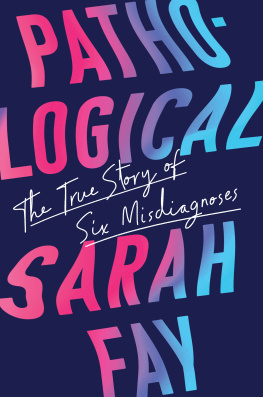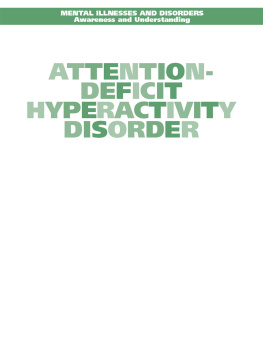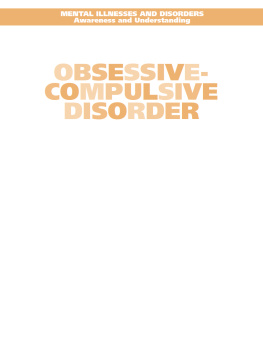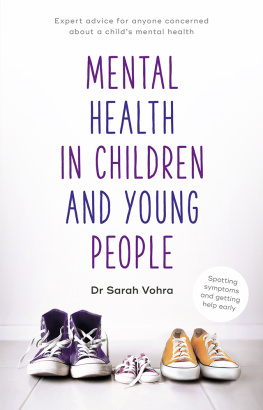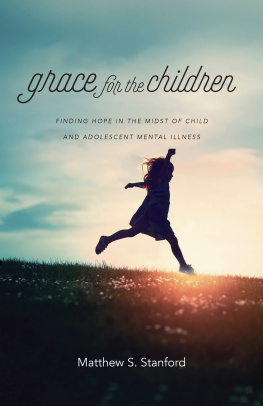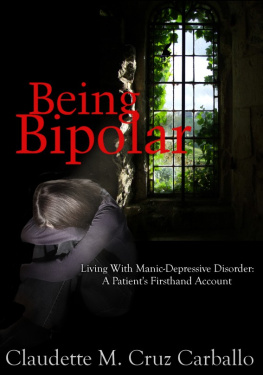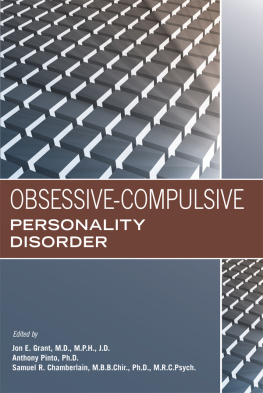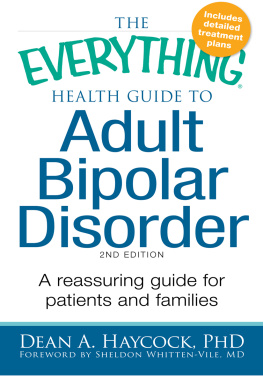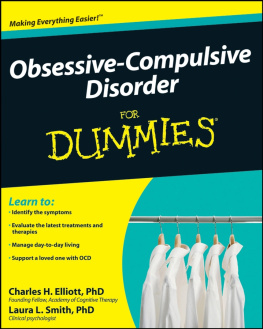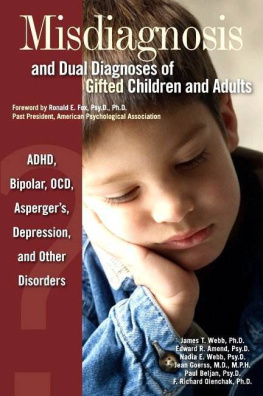The slower we walked, the more I seemed to sweat. Summer. Chicago. The two of us wandering the streets around Northwestern Memorial Hospital looking for the inpatient psychiatry unit where Dr. H said I could find help. Id left him a message. He hadnt called back.
The buildings seemed dislocated and distant. Doctors and nurses in scrubs passed us on the sidewalk. Their voices cracked against my chest. A cab honked. A truck started up, billowing exhaust.
I heard the strain in your voice when you asked why the psychiatric unit wasnt where Dr. H said it would be. Worry weighed down the skin of your barely aging face. (People said you looked fifty though you were in your seventies.)
The families, people say. The families go through hell.
Ill never know what it was like for all of you. So much of that time I spent alone, trying to understand the six diagnoses I thought were real.
* * *
This isnt a classic mental-illness memoir. That kind of memoir is a quest story. From the beginning, our hero is exceptional. Shes a debutante or a celebrity or a genius or at the very least she attends an Ivy League school when her enviable potential is dashed by mental illness. Her journey is extreme. She must leave the ordinary world in search of the elixir that will ultimately cure her. Trials hinder her attempts to find it. Shes committed to a psychiatric facility. Or she becomes a professional mental patient, a victim of the psychiatric industrial complex. Of course she triumphs, ending up in the light, elixir in hand: accepting medication or getting off medication; finding true love or God; discovering her illness was physical (thank goodness!), not mental after all; devoting herself to meditation or some other supposedly natural remedy; or finding a brilliant physician or freethinking therapist who saves her. On the books final pages, shes no longer ill or has embraced her illness. Shes rejected her diagnosis or accepted it.
My path wasnt that clear. I went to a good university and may or may not have shown promise. I wasnt a professional mental patient. I wasnt a victim. Doctors didnt find a physical cause. Many elixirs were tried: food, alcohol, exercise, various therapies, natural remedies, and, finally, psychotropic drugs. The result was pain, monotony, confusion, and messiness.
Yes, I was toldwith certainty, one after anotherI had anorexia, major depressive disorder (MDD), anxiety disorder, attention deficit hyperactivity disorder (ADHD), obsessive-compulsive disorder (OCD), bipolar disorder. Yes, I almost died.
But I was a willing participant. No one brainwashed me. I believed in and accepted those six diagnosesadopted them, thought in terms of them, identified myself as them, medicalizing my difficulties and discomforts, pathologizing my emotions and thoughts and behaviors.
Embracing a diagnosis can be a good thing. It can increase the likelihood that a person will get help. It can lead someone to find a community of people who suffer from the same diagnosis. It can empower a person.
But it led me into a spiral. Each diagnosis was a self-fulfilling prophecy. The sicker I believed myself to be, the more evidence I found confirming I was sick. The more evidence I had, the more certain I became. The more certain I became, the more willing I was to undergo treatments. The more treatments I underwent, the sicker I believed myself to be.
* * *
Its too easy to lay blame, but I do. I blame a book: the Diagnostic and Statistical Manual of Mental Disorders (DSM).
How can I blame pages, words, letters? Dots. Dashes. Lines. Marks on paper.
Because the DSM is powerful. Jeffrey Lieberman, former president of the American Psychiatric Association (APA), called it the most influential book written in the past century. Sociologist Allan Horwitz, author of DSM: A History of Psychiatrys Bible, writes that it controls the diagnoses we receive and how we think about them.
Which might be fine if the DSM had scientific merit.
Which it doesnt.
Some of the most prominent psychiatrists have referred to DSM diagnoses as constructs and placeholders.
But I didnt know DSM diagnoses were invented and had no validity and little reliability until it was almost too late. Validity, which is considered the most fundamental principle in medicine, would mean that DSM diagnoses can be objectively measured, which they cant.
Its tempting to fault the DSMs authors, those members of the APA who wielded those words and punctuation marks. How else did so many unproven diagnoses end up on the most recent editions many, many, many pages? Over the editions, the number of diagnoses and spectrums and subtypes has grown. And grown. The DSM-5 clocks in at 947 pages with 541 diagnostic categories, compared to the scant 132 pages and 128 categories in the DSM-I. The DSMs authors might defend themselves by saying they just want to make sure those who need care receive a diagnosis, even if (they leave this part out) DSM diagnoses are speculative at best.
Its also tempting to reproach the psychiatrists and psychologists and social workers who level DSM diagnoses even though they know those diagnoses are unproven. They claim they have to label a patient with a diagnostic code to satisfy the insurance company and to get paid, even if (they leave this part out) it means letting a patient believe she suffers from a diagnosis thats essentially theoretical.
And pharmaceutical companies who have benefited from the DSMs revisions.
And the academic psychiatrists and researchers who have profited from and built their careers on pathologizing normal distress.
But the wordsso convincingdo the most damage. Theyve taken on a life of their own. The DSM has become, as some say, a work of culture. Its socially sanctioned. Many, many people believe its a scientifically proven medical manual; its notnot even close.
* * *
I could be the poster child for the dangers of the DSM. I lived through its most significant editionsthe DSMs III, III-R, IV, IV-TR, 5, 5-TRand received six of its many, many diagnoses. I call them misdiagnoses because all DSM diagnoses are misdiagnosesi.e., incorrect, inaccurate, inadequate. They were created by loosening criteria, adding specifiers, shifting symptoms, broadening definitions, and lowering thresholds.
How could I have so willingly accepted all those diagnoses and taken all those medications? Why did I believe the words that came from the DSM? I asked so few questions, lived with such little awareness. How could I have strayed so far and been so naive?
Like so many whove been diagnosed, I wanted an explanation for what was happening to meinside meand no one had warned me about the DSM.
Pathological is everything I wish Id known. Its an attempt to help others understand the truth about the DSM diagnoses they or their loved ones might receive. All those years, I wasnt the only one being diagnosed. There were the students with autism and oppositional defiant disorder (ODD) I taught in the New York City public schools; Shubi, a young man with schizophrenia found not guilty by reason of insanity for murder; and the many, many college students who came to my office hours and spoke so unquestioningly about their anxiety disorder or depression or ADHD brains.
* * *
I should explain my preoccupation with punctuation. To many people, punctuation is a tedious part of human existence. But Ive spent my life writing and reading and teaching people how to write. Punctuation is the basis for communication. Its how we form thoughts. Its the mechanism behind our digital and written interactions, the vehicle that drives our connections and disconnections. Punctuation, like pathology, orders and categorizes; it tries to make sense of whats otherwise disordered.

